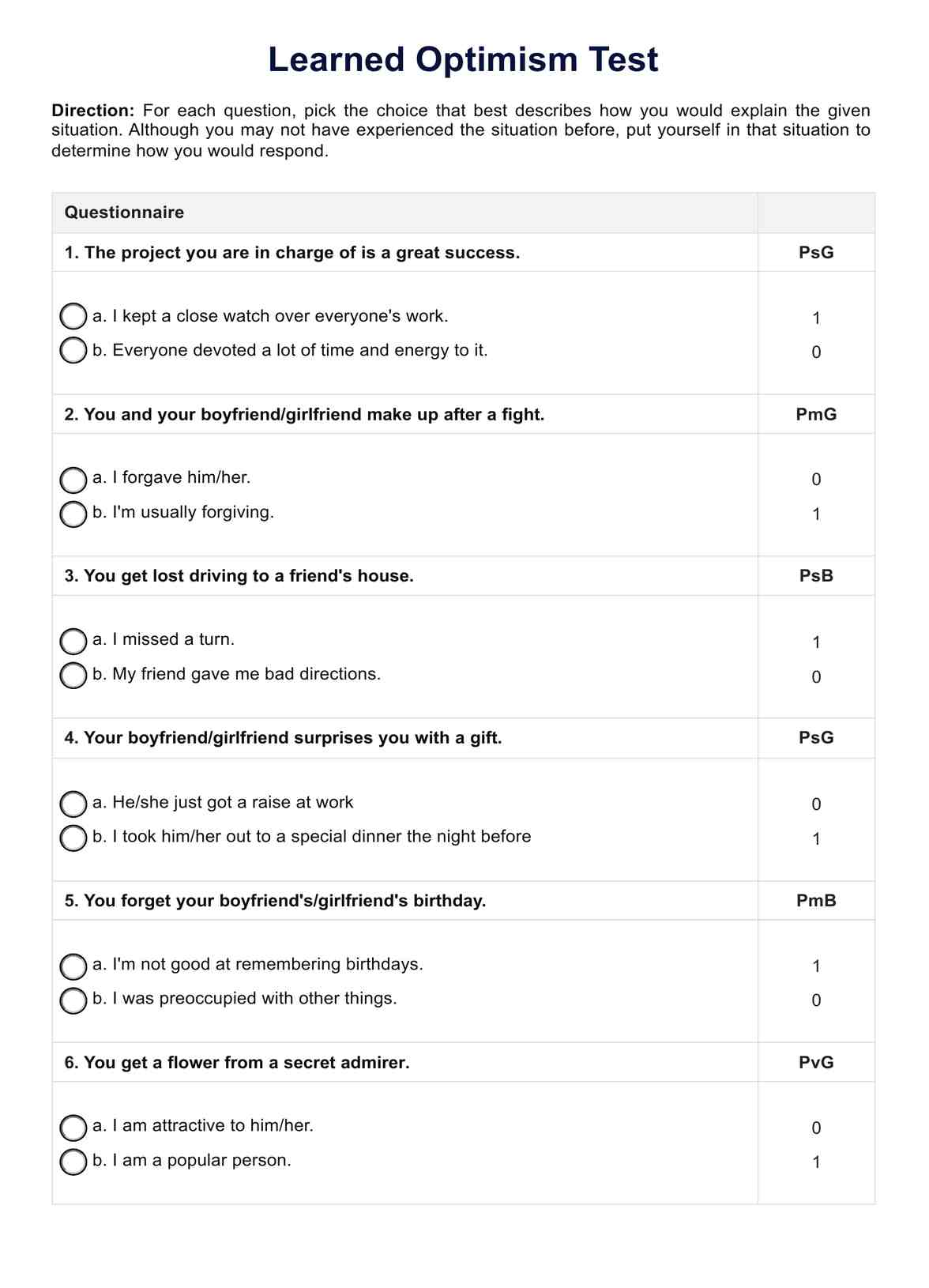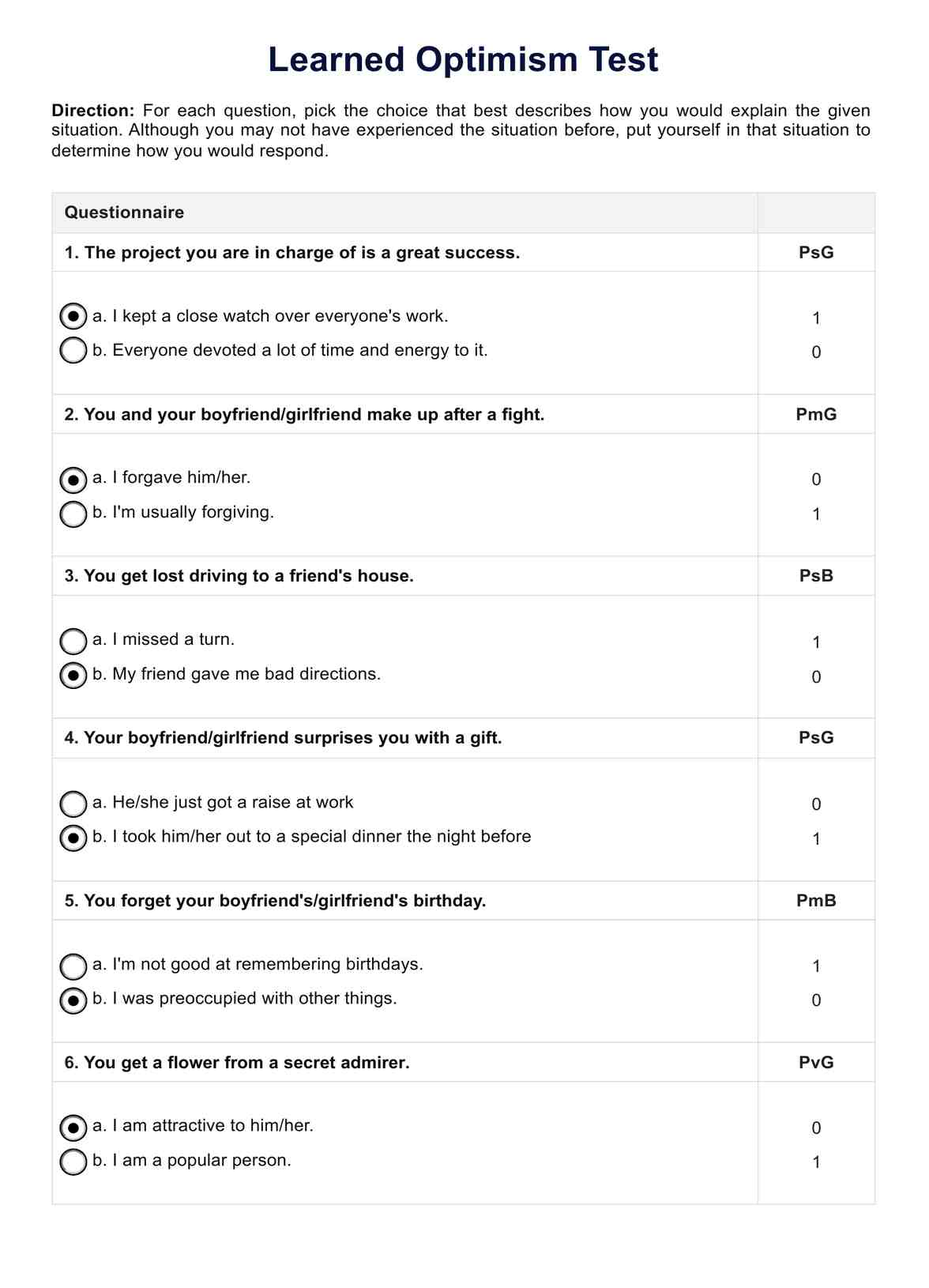Learned Optimism Test
Help your clients know more about learned optimism with our free Learned Optimism Test. Download our PDF and help someone foster a positive mindset.


What is learned optimism?
The learned optimism concept, coined by Martin Seligman in positive psychology, suggests that individuals can develop an optimistic viewpoint. According to Seligman, adopting a more optimistic stance can significantly improve well-being (Seligman, 2006).
By cultivating learned optimism, individuals can reframe their thinking patterns, challenge negative self-talk, and develop a greater sense of agency and control over their lives. Individuals can gradually shift towards a more optimistic outlook through cognitive restructuring, positive visualization, gratitude exercises, and problem-solving skills training.
Learned optimism provides greater emotional resilience, psychological well-being, and overall life satisfaction. It empowers individuals to approach life's challenges with greater confidence, flexibility, and positivity, leading to a more fulfilling and meaningful existence.
How do psychologists integrate this into their work?
Psychologists employ learned optimism techniques across various domains of their practice, integrating them into therapeutic approaches like cognitive-behavioral therapy (CBT), where clients are guided to identify and challenge negative thought patterns, reframing them towards a more optimistic perspective.
In treating depression and anxiety, optimism interventions play a pivotal role, significantly alleviating symptoms by bolstering resilience and enhancing coping skills through learned optimism exercises. Group therapy settings provide fertile ground for practicing optimism through interactive activities, role-playing, and situational games, with the added benefit of social support and modeling reinforcing optimistic thinking.
Why is optimism important?
Optimism manifests in improved physical health, as optimists tend to exhibit stronger cardiovascular health, bolstered immune systems, and reduced levels of stress and pain, attributable to their engagement in healthier behaviors like regular exercise, balanced nutrition, and refraining from smoking, ultimately contributing to increased longevity.
Optimism intertwines with mental well-being, correlating with lower rates of depression and anxiety, fostering happiness, elevated self-esteem, and heightened life satisfaction while nurturing resilience in the face of adversity.
This positive mindset also translates into greater achievement, propelling optimists towards academic and professional success through enhanced persistence in goal pursuit and motivation for positive action. Optimism fosters enriched social relationships, as optimists are perceived as more likable, experience fewer social rejections, and enjoy greater satisfaction and longevity in romantic partnerships, facilitated by constructive problem-solving and a perceived sense of robust social support. Lastly, optimism facilitates effective coping strategies, empowering individuals to tackle challenges head-on with solution-focused approaches, thereby promoting faster recovery from setbacks.
Learned Optimism Test Template
Learned Optimism Test Example
What is a Learned Optimism Test?
The Learned Optimism Test, developed by psychologist Martin Seligman, is a 48-question questionnaire designed to assess an individual's level of optimism by evaluating their thinking style. It presents respondents with hypothetical good and bad events and asks them to select explanations that reflect their likely thoughts about these situations.
The test measures three key dimensions:
- Permanence: This assesses if individuals view bad events' causes as temporary or permanent.
- Pervasiveness: It examines if negative experiences are seen as isolated incidents or universal, affecting all areas of life.
- Personalization: This determines if individuals blame themselves or external circumstances for bad events.
Scoring provides an overall optimism score and subscores for each dimension, with higher scores indicating a more optimistic thinking style.
Seligman suggests that optimism can be cultivated by challenging and changing negative self-talk and beliefs. The Learned Optimism Test serves as a diagnostic tool to understand one's current level of optimism. It is prominently featured in Seligman's book, "Learned Optimism: How to Change Your Mind and Your Life," to help readers assess and enhance their optimism.
Benefits of conducting this test
The benefits of conducting the Learned Optimism Test can have a significant impact on personal growth and well-being:
- Self-awareness: The Learned Optimism Test provides individuals with insights into their attribution style, resilience, and coping strategies, fostering a deeper understanding of their thought patterns and behaviors.
- Identification of areas for improvement: By pinpointing areas where pessimistic thinking may prevail, individuals can work towards cultivating a more positive outlook, contributing to greater emotional resilience and well-being.
- Personal development: Understanding one's learned optimism tendencies empowers individuals to develop healthier coping mechanisms and problem-solving skills, enhancing their ability to navigate life's challenges effectively.
- Enhanced relationships: Optimistic individuals are often perceived as more likable and adept at maintaining positive relationships. By recognizing and cultivating optimism, individuals can foster healthier and more satisfying social connections.
- Mental health benefits: Learning optimism can help counter learned helplessness and reduce rates of depression and anxiety, promoting overall mental well-being.
How can psychologists teach optimism?
Psychologists employ various strategies to teach optimism to their clients, including cognitive-behavioral therapy techniques aimed at challenging pessimistic thoughts and replacing them with more optimistic ones. This approach targets emotions by altering the thoughts and behaviors contributing to distress, teaching clients to recognize negative self-talk and dispute unhelpful beliefs.
Incorporating concepts and exercises from positive psychology, such as the ABCDE model and imagining one's best possible self, fosters learned optimism. Additionally, practices like gratitude, mindfulness, and self-compassion help shift focus from negativity to a balanced perspective, potentially rewiring the brain over time.
By elucidating the benefits of optimism—such as better health and increased motivation—therapists encourage clients to commit to learning optimism skills. Tailoring interventions to specific populations, like children or older adults, ensures approaches are suited to cognitive abilities, stressors, and treatment goals, promoting effective learning and application of optimism principles.
Reference
Seligman, M. E. P. (2006). Learned optimism: How to change your mind and your life. Vintage Books.
Commonly asked questions
The timeframe for learning optimism can vary depending on individual factors such as mindset, motivation, and the complexity of underlying issues. Some people may notice improvements relatively quickly, while for others, it may take more time and effort to see significant changes.
While learning optimism can have numerous benefits, it's essential to approach it in a balanced manner. Unrealistic optimism or ignoring legitimate concerns can lead to poor decision-making. It's crucial to maintain a realistic perspective while cultivating optimism.
Yes, learned optimism techniques are often incorporated into therapy for various mental health conditions such as depression, anxiety, and PTSD. By challenging negative thought patterns and fostering a more positive outlook, learned optimism can complement traditional treatment approaches and improve overall mental well-being.





















-template.jpg)


















































































